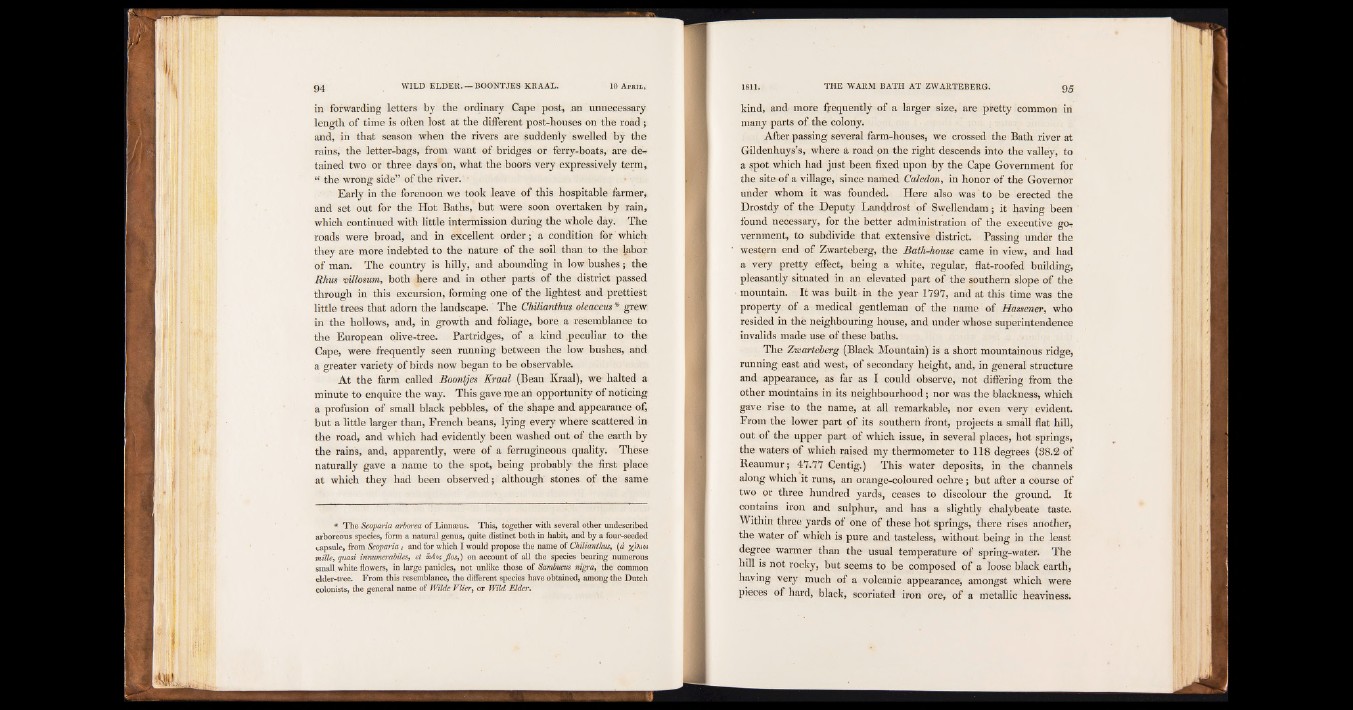
in Forwarding letters by the ordinary Cape post, an unnecessary
length of time is often lost at the different post-houses on the road;
and, in that season when the rivers are suddenly swelled by the
rains, the letter-bags, from want of bridges or ferry-boats, are detained
two or three days on, what the boors very expressively term,
“ the wrong side” of the river.
Early in the forenoon we took leave of this hospitable farmer,
and set out for the Hot Baths, but were soon overtaken by rain,
which continued with little intermission during the whole day. The
roads were broad, and in excellent order; a condition for which
they are more indebted to the nature of the soil than to the labor
of man. The country is hilly, and abounding in low bushes; the
Rhus villosum, both here and in other parts of the district passed
through in this excursion, forming one of the lightest and prettiest
little trees that adorn the landscape. The Chilianthus oleacem * grew
in the hollows, and, in growth and foliage, bore a resemblance to
the European olive-tree. Partridges, of a kind .peculiar to the
Cape, were frequently seen running between the low bushes, and
a greater variety of birds now began to be observable.
At the farm called Bocmtjes Kraal (Bean Kraal), we halted a
minute to enquire the way. This gave me an opportunity of noticing
a profusion of small black pebbles, of the shape and appearance of,
but a little larger than, French beans, lying every where scattered in
the road, and which had evidently been washed out of the earth by
the rains, and, apparently, were of a ferrugineous quality. These
naturally gave a name to the spot, being probably the first place
at which they had been observed; although stones of the same
* The Scoparia arborea of Linnaeus. This, together with several other undescribed
arboreous species, form a natural genus, quite distinct both in habit, and by a four-seeded
capsule, from Scoparia; and for which I would propose the name of Chilianthus, (a %/Ami
mille, quasi irinumerabiles, et avfloj Jlos,) on account of all the species bearing numerous
sTPf»B white flowers, in large panicles, not unlike those of Sambucus nigra, the common
elder-tree. From this resemblance, the different species have obtained, among the Dutch
colonists, the general name of Wilde VUer, or Wild Elder.
kind, and more frequently of a larger size, are pretty common in
many parts of the colony.
After passing several farm-houses, we crossed the Bath river at
Gildenhuys’s, where a road on the right descends into the valley, to
a spot which had just been fixed upon by the Cape Government for
the site of a village, since named Caledon, in honor of the Governor
under whom it was founded. Here also was to be erected the
Drostdy of the Deputy Landdrost of Swellendam; it having been
found necessary, for the better administration of the executive gor
vernment, to subdivide that extensive district Passing under the
western end of Zwarteberg, the Bath-house came in view, and had
a very pretty effect, being a white, regular, flat-roofed building,
pleasantly situated in an elevated part of the southern slope of the
mountain. It was built in the year 1797, and at this time was the
property of a medical gentleman of the name of Hassener, who
resided in the neighbouring house, and under whose superintendence
invalids made use of these baths.
The Zwarteberg (Black Mountain) is a short mountainous ridge,
running east and west, of secondary height, and, in general structure
and appearance, as far as I could observe, not differing from the
other mountains in its neighbourhood; nor was the blacknessy which
gave rise to the name, at all remarkable, nor even very evident.
From the lower part of its southern front, projects a small flat hill,
out of the upper part of which issue, in several places, hot springs,
the waters of which raised my thermometer to 118 degrees (38.2 of
Reaumur; 47.77 Centig.) This water deposits, in the channels
along which it runs, an orange-coloured ochre; but after a course of
two or three hundred yards, ceases to discolour the ground. It
contains iron and sulphur, and has a slightly chalybeate taste.
Within three yards of one of these hot springs, there rises another,
the water of which is pure and tasteless, without being in the least
degree warmer than the usual temperature of sprirjg-water. The
hill is not rocky, but seems to be composed of a loose black earth,
having very much of a volcanic appearance, amongst which were
pieces of hard, black, scoriated iron ore, of a metallic heaviness.